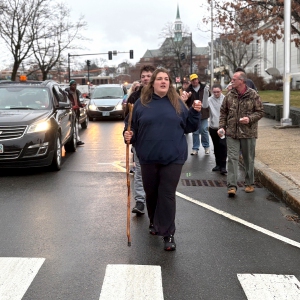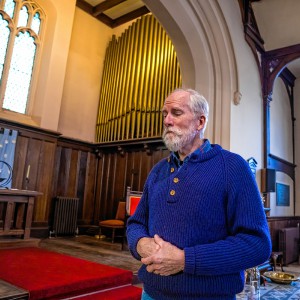Roof maintenance mishap disrupts residents of Concord’s mental health supportive housing

Fellowship Housing Opportunities on South State Street in Concord. GEOFF FORESTER—Monitor staff
| Published: 08-01-2024 5:02 PM |
For seven years, Sven Bergen has called his apartment on South State Street in Concord his home. The building, a part of Fellowship Housing Opportunities, a nonprofit dedicated to providing stable housing for individuals with mental health challenges which houses seven other apartments, has been more than just a place to live.
“It’s like your own home,” Bergen said, sinking into his blue armchair and taking in the familiar comfort of his living room. “I really like it here.”
However, in April, disaster struck.
Routine roof maintenance became a nightmare when a sudden April downpour triggered severe flooding, forcing all eight residents to evacuate. The compromised roof, inadequately secured, allowed torrents of rain to infiltrate the building, causing extensive damage.
Herb Carpenter, the executive director of Fellowship Housing Opportunities, revealed that the contractor in charge of the roof work had subcontracted the job without their knowledge.
From the outset, Carpenter’s team had concerns about the subcontractor’s workmanship.
“The rain came when they were taking off the old roof and insulation,” said Carpenter. “The roof was not properly secured for the rain.”
The gas and electricity were shut off to ensure safety.
Article continues after...
Yesterday's Most Read Articles
 What to know about the plan to allow students to attend any public school in the state
What to know about the plan to allow students to attend any public school in the state
 ‘If you’re proud of it, we want to see it’: Cars & Coffee on Capitol returning to Concord
‘If you’re proud of it, we want to see it’: Cars & Coffee on Capitol returning to Concord
 ‘A wild accusation’: House votes to nix Child Advocate after Rep. suggests legislative interference
‘A wild accusation’: House votes to nix Child Advocate after Rep. suggests legislative interference
 ‘He went home’: Remembering Rodney Moody, ‘the mayor’ of Concord’s homeless community
‘He went home’: Remembering Rodney Moody, ‘the mayor’ of Concord’s homeless community
 A Franklin congregation loves its 19th-century home. Insurance woes could spell its decline.
A Franklin congregation loves its 19th-century home. Insurance woes could spell its decline.
 High school softball previews: Concord looks to bounce back from heartbreaking exit
High school softball previews: Concord looks to bounce back from heartbreaking exit
The incident disrupted the stability that the organization works hard to ensure, leaving Bergen and his neighbors constantly moving from one place to another while repairs were underway.
For individuals with mental health challenges, stability and routine are crucial, Carpenter noted.
“Having someone like a landlord that is aware of what’s going on and can help them directly, either with issues around the apartment or issues with their mental health,” said Carpenter. “One of the biggest things is just making sure that they are keeping their appointments, and taking their medications.”
All residents go through an application process with Riverbend Community Mental Health, and there are currently 105 people on the waiting list for housing at the Fellowship Housing Opportunities.
Bergen’s first hint of trouble came when he noticed his notepads on the kitchen counter were damp.
“It was getting a little wet,” he recalled. “Then about 35 minutes later I noticed some water coming under the stove.”
As a ground-floor resident, Bergen’s apartment sustained the least damage. However, the four apartments on the second floor were severely affected, with water ruining carpets and even dripping into electrical fuse boxes.
With water beginning to drip from the ceiling, Bergen had just 30 minutes to pack up his essentials, unaware it would be over a month before he could return to his apartment.
Meanwhile, Carpenter and his team scrambled to find temporary accommodations for the displaced residents, booking them into various hotels around Concord.
Stays in these hotels stretched up to two weeks each, as the timeline for repairs remained uncertain.
Some residents had pets, and finding hotels that would accept them became a priority.
“It was interesting that the pets were extremely important to the residents more so than themselves in terms of their company,” said Carpenter. ” There was no way they would allow their pet to go to boarding.”
Housing eight residents for almost 10 weeks in hotels came at a cost of $67,729 for the Fellowship Housing Opportunities. In addition, they provided over $7,600 in gift cards for food and meals. Beyond these expenses, $15,500 was spent on remediation work, with another $24,479 allocated for roof repairs.
The residents, all in low-income housing, were still required to pay their rent while displaced.
They normally pay 30% of their income, with the balance covered by various subsidies from Concord Housing, New Hampshire Housing, or the state-run Bridge program, which assists individuals until their housing vouchers are activated.
Unfortunately, the subsidies could not be disbursed while the residents were not occupying their apartments.
“We lost some revenue in terms of subsidies,” said Carpenter.
Bergen stayed at five different hotels before he was finally able to return to his apartment, and not all of them were in Concord. Without a car, navigating between these locations was especially challenging for him.
Used to Concord’s walkability for his appointments at Riverbend and his daily routines like grocery shopping, relocating to a hotel in a less accessible area was particularly difficult.
When he had to leave the Comfort Inn in Concord for the Fairfield Inn & Suites in Hooksett for the following two weeks, Bergen was a little upset.
“You really need a vehicle to get around in Hooksett,” Bergen said. “It’s not like Concord. There aren’t many places you can walk to.”
Despite the frequent moves during the repair work, Bergen and most others adjusted relatively well.
However, Carpenter noted that one resident was reluctant to leave the hotel and return to independent living.
This individual was eventually moved to a facility where three people shared a living room and kitchen.
“Sometimes when you transport individuals from one hotel to another, they get to the point where they’re familiar with their surroundings and the people that can help and work with them,” explained Carpenter. “Then they’re moved and had to get used to a whole new environment.”
Since Bergen’s apartment sustained the least damage, he was the first to return on July 3.
Although he was thrilled to be back, he missed the company of his fellow residents. Once everyone had returned, he felt a sense of relief and contentment.
“I’m very happy being here,” said Bergen. “Being here is like being in my own house as a kid with relatives and siblings.”







 Bow police to purchase drone for improving public safety
Bow police to purchase drone for improving public safety
